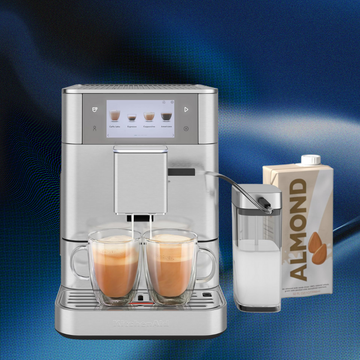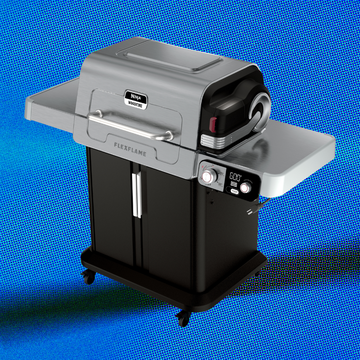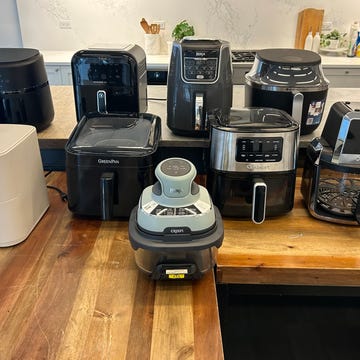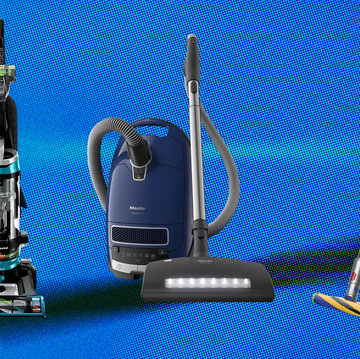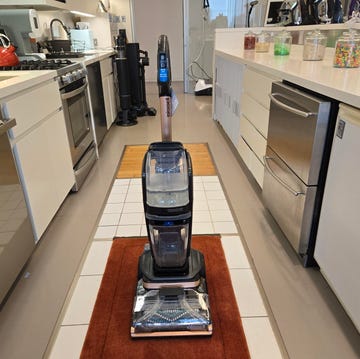6 Best Kamado Grills, Tested by Experts
Sear, smoke and bake almost anything on these versatile grills.

We've been independently researching and testing products for over 120 years. If you buy through our links, we may earn a commission. Learn more about our review process.
You’ve probably heard of the Big Green Egg — even if you don’t yet own a grill. Its iconic, egg-shaped silhouette is hard to miss at backyard barbecues and grilling competitions, but it's not the only kamado grill worthy of your attention. Several manufacturers have refined and expanded the kamado grill concept, offering more features, upgrades, accessories, grate options and price points to suit both beginners and die-hard pitmasters.
"While kamado grills can be intimidating for beginners," says Nicole Papantoniou, director of the Good Housekeeping Institute's Kitchen Appliances and Innovation Lab. "We think they’re well worth the learning curve."
The Lab has tested over 90 grills, including charcoal grills and kamado grills. We evaluate ease of use, heat control, build quality, price point and performance. As with pellet grills, temperature control and a wide temperature range are essential in a great kamado grill, so our top recommendations are all well-insulated while also providing good airflow. We tested all of the kamado grills in this roundup and still have them set up in consumers' homes for long-term testing.
Pros
Full of features and accessories
Multi-level grate system
Easy cleanup
Cons
Pricey, but it will last you a long time
Cooking area: 250 sq. in. | Dimensions: 49" x 47" x 30" | Material: Ceramic | Accessories included: Built-in thermometer, folding side shelves, grill gripper, ash tool, ceramic heat deflectors
The Kamado Joe Classic II pairs a robust, insulated shell for maintaining heat with a bevy of useful specialty features and accessories, making it the best kamado grill for most people.
In testing, we loved its multi-level grate system for creating different temperature zones. The lid is easy to lift, doesn’t slam down and locks closed for heat maintenance. The vent system is clearly marked, making it easy for beginners to control the heat of their fire, from low smoke at 250°F to 750°F.
We also love that this model comes with accessories and wheels for transportation. Many kamado grills require you to buy these extras separately. The ash drawer makes cleanup simple, which is crucial for maintaining good airflow and achieving high temperatures while grilling.
Combine all this with the Kamado Joe’s fire engine red design and reasonable price point (for a kamado), and you have yourself a backyard champion. (The Classic III comes with a new airflow system, but for the current price, we prefer the Classic II.) And if you want to go high-tech, check out the Kamado Joe Konnected model below, which features digital controls.
Pros
Lightweight
Less expensive than most
Sturdy triple-walled stainless steel build
Cons
Difficult to set up
Possible issues when cooking at low temperatures
Cooking area: 445 sq. in. | Dimensions: 47" x 45" x 31" | Material: Stainless steel | Accessories included: Grill grate lifter, carbon steel side shelves, removable stainless steel warming rack
If the steep price point of the average kamado is preventing you from trying this grilling style, consider the Char-Griller Akorn. This grill is a third of the price of the most popular kamados on the market.
The Akorn's triple-walled stainless steel build is lighter than the ceramic you find in most kamados, but testers say that the Akorn can still maintain even very high temperatures with ease. It has also proved to be very durable in our tests — one tester's unit got tossed into the woods by a bear and is still in great shape. The grill's included wheels and lighter weight also make it easier to transport than others.
Our tester appreciated that the grill is easy to clean, and the digital control feature allows you to set a specific temperature, which it closely maintains. It smoked short ribs with a great smoke ring, delicious bark and tender meat.
However, about once out of three uses, he got an error code on the screen, possibly related to a too-low temperature. (The solution was to unplug the grill, reset the digital control and reset the desired temp.) This means the grill may require you to pay attention throughout a longer smoke.
Some Akorn owners also complain that this model doesn't always burn long enough while smoking and that the grill can be challenging to set up and use initially. But with a 302-square-inch cooking area and basic accessories included, you won't find a better value for the price.
Pros
Superior temperature control
Optional white glove assembly
Customize with a wide array of accessories and add-ons
Cons
More expensive than similar models
Cooking area: 262 sq. in. | Dimensions: 33" x 22" x 27" | Material: Ceramic | Accessories included: None, everything sold separately
The Big Green Egg's passionate cult following is largely responsible for the popularity of kamados in the United States. That's because the brand makes impressive grills that are designed to last a long time.
These hefty ceramic domes can reach temperatures exceeding 1,000°F, making them excellent pizza ovens as well as grills. In testing, the Big Green Egg proved very consistent in maintaining temperatures — both high and low — and was easy to get started and clean. It cooked tender ribs and juicy chicken thighs.
However, when you buy the Big Green Egg, all you're buying is the grill itself. If you'd like side tables, additional cooking grates, wheels, pizza stones or any other cooking accessories, you'll need to purchase them separately. While this customizable ecosystem of add-ons is fun for hobbyists, it means you get less out of your base model purchase and makes the total cost of the Big Green Egg more expensive than other kamados that perform similarly.
You can opt for white glove assembly (an additional $149+), in which the local dealer delivers the grill to your home and sets it up, making it more approachable and ready to use out of the box. (Setting up kamado-style grills yourself isn't hard per se, but the parts are heavy and require two people to assemble. Some also have several ceramic pieces that need to be assembled inside the grill.)
Pros
Can reach high temperatures quickly
Second grill grate included
Lightweight and easy to transport
Cons
Possible sealing and rust issues
Cooking area: 480 sq. in. | Dimensions: 47" x 41" x 27" | Material: Stainless steel | Accessories included: Second rack, detachable side shelves, mobility cart, multi-tool
The Broil King Keg 5000 is another kamado grill that’s made of steel instead of ceramic, making it lighter and, therefore, easier to transport and less likely to crack.
Because this model also comes with a trailer hitch, it’s ideal for tailgating, camping and life on the road, where grilling is a must. Despite its lighter build, we found in testing that this kamado can reach high temperatures quickly and retain heat, just like a ceramic model. We also appreciated the included second grill grate, which could be used to create a smaller secondary layer.
While the slate gray exterior may not be as pretty as the finishes on its ceramic competitors, the Broil King is a no-nonsense kamado with 280 square inches of base cooking space and a lot of versatility. Keep in mind that some reviewers have complained about sealing and rust issues.
RELATED: The Best Portable Grills
Pros
Digital control allows for precise temperature
App makes it good for beginners
Easy to start and operate
Cons
Gasket around the opening cannot be cleaned
Cooking area: 250 sq. in. | Dimensions: 35" x 33" x 29" | Material: Stainless steel | Accessories included: Grill gripper, ash tool, heat deflectors, accessory rack, meat probe
This model is the high-tech sibling of our top-tested kamado grill. Its digital control panel monitors air temperature and includes a probe for precise temperature control. An app lets you manage the grill remotely and provides tips for achieving optimal results, making it a great option for beginners.
One tester noted that the grill was easy to start, and they appreciated how the removable heat deflector shielded food from the flames. It made juicy spatchcocked chicken and tender ribs that were not at all dried out.
Another tester praised its sturdy build and compact design, including the folding side tables. "Two years of use, and it's still in perfect shape!" Emptying the ash and cleaning the grates are easy. The only thing that gets dirty and can't be cleaned is the gasket around the opening, so try to be careful and avoid getting it dirty.
Pros
Cool touch exterior
Bluetooth app and temperature probes
Easy to clean
Cons
Loses heat more drastically than ceramic models
Cooking area: 219 sq. in. | Dimensions: 21" x 45" x 27" | Material: Aluminum | Accessories included: Water cup (to add moisture to the internal cooking environment), pizza stone (can also be used as a heat deflector), grill grabber
Designed in collaboration with chef Heston Blumenthal, this grill looks more like a piece of modern art than a backyard cooker. "I love the sleek, sculptural shape," says our tester. "It's a real showpiece."
Instead of a ceramic dome, the Everdure 4K retains heat well thanks to its double-walled construction. It's encased in die-cast aluminum, which remains cool to the touch even when the internal temperature reaches over 700°F. That means you can grill, smoke, roast or bake without worrying about your kids or pets brushing up against it.
An electric ignition system makes lighting a breeze. A bottom hatch allows for feeding charcoal without opening the lid (addressing a common pain point among Big Green Egg users).
Our tester appreciated the variety of cooking surfaces made possible by all the accessories, including a pair of stainless steel and cast-iron grills that can be positioned at different heights, allowing for direct and indirect grilling, slow roasting, smoking, etc
The temperature probes help ensure perfect results, especially since they can be monitored from the app. You'll want to utilize the probes, as some users have noted that opening the lid during a direct grill session results in more heat loss compared to traditional ceramic kamados.
For cleanup, the interior components are removable, and the exterior can be wiped clean. The closed-off design keeps mess and ash under control in addition to fending off weather.
How we test the best kamado grills

We've tested more than 90 outdoor grills since 2011, including gas grills, charcoal grills, kamado grills, pellet grills, electric grills and portable grills. (And that number doesn't even include indoor grills!)
To determine which new grills to test, we scour the internet and popular retailers for newcomers, keep our eyes peeled at industry trade shows like CES and the International Builders' Show and communicate with brands to learn about their latest models and innovations.
From there, we request samples to test and either assemble them ourselves or hire an outside company to assist with the assembly. We take notes on how easy or hard it is and record how long it takes, but we don't score the process since it's easy enough to buy grills pre-assembled (which we recommend), and everyone's skill level and patience level are different.

When we test charcoal grills, we assess performance and ease of use.
✔️ Steak test: We cook a steak on high to see how well it sears, how quickly it cooks and if it causes any flare-ups.
✔️ Chicken test: After the steak, we test chicken thighs at a lower temperature to assess how the grill performs on a longer cook.

✔️ Ease of use tests: We value clear instructions, labeled parts and simple assembly. We also consider helpful accessories like shelves, side tables, tool holders, built-in thermometers, wheels, types of igniters and more.
✔️ Consumer testing: After we complete our testing, we set the grills up in consumer homes for long-term testing.
What to look for when buying a kamado grill

✔️ Material:
- Traditional kamado grills have a thick ceramic body for insulation. These grills are generally very heavy and built to last for many years, although you'll need to be careful not to tip or drop them as they may shatter.
- Some kamado models are made of aluminum or double- or triple-insulated steel, which makes the body more lightweight and less likely to shatter if tipped. However, steel is more prone to rusting and, therefore, generally won't last quite as long as ceramic. Steel is also not as good an insulator as ceramic, although the difference is very marginal in real use cases (all the steel models we included can retain heat very well). The choice of material is up to you and your grilling priorities.
✔️ Accessories: Some kamado models come with accessories like side tables, extra cooking grates, wheels, pizza stones and grate tongs, while others only include the basic grill. As you start to cook more with your kamado, many of these accessories will become very useful to you (particularly the table and extra grates). Make sure to factor in the price of purchasing these tools separately if they're not included with the base model.
✔️ Vents: The ventilation in a kamado is how you control the heat of your grill — the more air you let in, the hotter the fire will burn. Prioritize grills with good ventilation systems that are easy to use and operate. Some, like the Big Green Egg, are entirely manual, while others have specific temperature control settings.
✔️ Size: Kamado grills can be intimidatingly large due to their unique shape and cooking capacity. When shopping, choose a size that's right for you and your family. If you're investing in a grill to host many cookouts, an extra-large size with at least a 400-square-inch cooking area (like the Broil King) is a good start. However, if you're mostly grilling for yourself or a small family, a smaller model with approximately 250 square inches of cooking area should be sufficient without being unwieldy. Keep in mind that the larger the grill, the more coals you'll need to light and keep the fire going.
✔️ Shape: Most kamado grills have a unique, oblong egg shape that creates an efficient cooking area and allows for good airflow. However, this shape prevents you from traditional two-zone charcoal grilling. If you're committed to this kind of two-zone cooking, look for a kamado that is stout and oval-shaped with a wider base, such as the Everdure 4K.
What is a kamado grill?

The kamado design traces its roots back more than 3,000 years to clay ovens used in China and later became a standard in Japan, where similar cooking vessels called "mushikamado" were used to steam rice. The modern ceramic kamado grill, fueled by lump charcoal, emerged in the US in the mid-20th century and gained popularity with the launch of the Big Green Egg in the 1970s. Since then, kamado grills have gained a cult-like following for their fuel efficiency, even heat distribution and unmatched flavor in grilling recipes.
The tall dome-shaped lids encourage airflow and thick insulated walls maintain both low and high temperatures for hours while retaining moisture. That means you can smoke a brisket, bake a loaf of sourdough and fire up artisan-level pizzas all with the same setup.
Are kamado grills worth it?

Yes, but it depends on how you cook. Kamado grills are absolutely worth it for people who value versatility, heat retention and flavor. Thanks to their thick, insulated walls, they can hold low-and-slow smoking temps for more than 10 hours with minimal fuel, but they can also crank up to over 700°F for searing steaks or making pizza.
What sets kamados apart is their multi-functionality. They're often described as outdoor ovens because you can grill, smoke, roast and bake in one unit. The airflow control is precise, allowing you to dial in the perfect temperature — something many standard charcoal grills can't match.
That said, they do have a learning curve. Kamado grills take longer to heat up than gas grills, and managing the temperature with vents requires a little practice. They're also heavy, usually not portable and good ones don't come cheap.
The bottom line is if you're looking for long-term flavor payoff and you don't mind investing a bit of time (and money), a kamado grill is an excellent choice. However, if you're looking for quick weeknight burgers with minimal fuss, a gas grill or pellet grill might be a better option.
Can you use regular charcoal in a kamado grill?

Technically yes, but it’s not recommended. Kamado grills are designed to run on lump charcoal, which is made from pure hardwood and burns hotter and cleaner than standard charcoal briquettes.
Here’s why lump charcoal is better for kamados:
- Less ash production: Briquettes create a lot of ash, which can clog airflow and interfere with temperature control.
- No chemical binders: Most briquettes contain fillers and binders that can leave behind unwanted flavors and residue inside the grill.
- Hotter burn: Lump charcoal burns hotter and lights faster, which is ideal for a grill that thrives on precise heat control.
If you're in a pinch, you can use briquettes — especially natural hardwood ones — but it should be an occasional solution, not the default.
How do you light a kamado grill?

Lighting a kamado is all about getting good airflow and avoiding lighter fluid (which can soak into the ceramic and ruin the flavor).
Follow your manufacturer's instructions, but you can typically light the charcoal right in the base of the grill. Plus, you can snuff them and use them again.
Here’s a step-by-step method our experts recommend:
- Open the vents: Ensure both the bottom and top vents are fully open to allow for maximum airflow.
- Fill with lump charcoal: Pour in lump charcoal until it reaches or slightly covers the air holes in the firebox.
- Use a safe fire starter: Place a couple of natural fire starter cubes, a torch or an electric starter in the center of the pile. Alternatively, use a charcoal chimney outside the grill, then pour in the charcoal once it's hot. Avoid lighting the entire charcoal bed unless you want high heat for searing. For smoking or low-and-slow cooking, light just a small section to control the burn rate.
- Wait for ignition: Let the fire starter catch and burn through some of the charcoal. After about 10 to 15 minutes, you’ll see coals glowing and edges turning white.
- Close the lid but leave vents open: Once the charcoal is well-lit, close the lid and allow the grill to preheat. Adjust the vents once you're 50°F to 75°F away from your target cooking temp to lock it in. Note: Opening a kamado lid too quickly can cause a dangerous backdraft of flame due to the sudden rush of oxygen. Always "burp" it first — open the lid a few inches to release heat and prevent flare-ups.
How do you clean a kamado grill?

Kamado grills are relatively low-maintenance, especially if you keep your grill clean.
After each cook:
- Burn off residue: After cooking, open the vents wide and let the grill run hot for 15 minutes to incinerate food bits and grease. (Some models have a “self-clean” cycle of sorts, where you run it for about 30 minutes or longer at a high temperature to burn off any residue.)
- Brush the grates: Use a grill brush and/or grill cleaner to clean the grates once they cool down a bit but are still warm.
Weekly or after a few long cooks:
- Empty the ash: This keeps the airflow unobstructed. Most kamado grills have perforated plates that allow ashes to fall through and collect in an ash drawer. Pull out the ash drawer to remove and toss the ashes, or use an ash tool to scrape off built-up ashes.
- Check vent openings: Ensure that air holes, firebox notches, and vents are clear.
Occasionally (every few months):
- Deep clean the interior: Remove the grates and internal fire ring/firebox parts. Scrape off grease or carbon buildup on the ceramic walls using a plastic scraper or dry brush. Avoid using soap or water inside the ceramic body, as it can seep into the porous material and affect the flavor.
- Wipe the exterior: For glazed ceramic, use only a damp cloth. For metal-bodied kamados (like the Char-Griller Akorn), you can use mild soap and a soft cloth.
Note: Avoid harsh chemicals or oven cleaners inside the grill. A hot burn is the best way to clean a kamado naturally.
Why trust Good Housekeeping?

Nicole Papantoniou is the director of the Good Housekeeping Institute Kitchen Appliances and Innovation Lab where she oversees all of the kitchen appliance related testing and content. She has tested more than 50 outdoor grills since she started in 2019. Smoking food has started to become one of her favorite ways to cook outdoors and she has tested and used multiple kamado grills and pellet grills, including the Big Green Egg, for years.
Perry Santanachote is a contributing writer for Good Housekeeping. She has been testing and writing about the best kitchen appliances and cookware — from toaster ovens and air fryers to handheld mixers and nonstick pans — for over 10 years. She has even more experience in the food industry, working as a recipe developer, food stylist and cook.
Perry Santanachote (she/her) has more than 15 years of experience in service journalism, specializing in food and consumer goods. She tests and reports on kitchen appliances and cooking tools. She also evaluates food products and cleaning supplies. She’s an experienced writer, product tester and recipe developer who has worked in labs, test kitchens and media organizations, including Thrillist and Consumer Reports.
Nicole (she/her) is the director of the Good Housekeeping Institute's Kitchen Appliances and Innovation Lab, where she has overseen content and testing related to kitchen and cooking appliances, tools and gear since 2019. She’s an experienced product tester and recipe creator, trained in classic culinary arts and culinary nutrition. She has worked in test kitchens for small kitchen appliance brands and national magazines, including Family Circle and Ladies’ Home Journal.

Readers Also Read
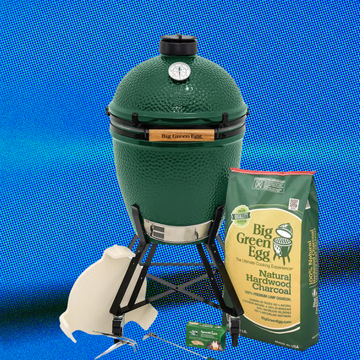
Big Green Egg Review

Experts Reveal How to Get Rid of Fruit Flies

The Best Dyson Vacuums
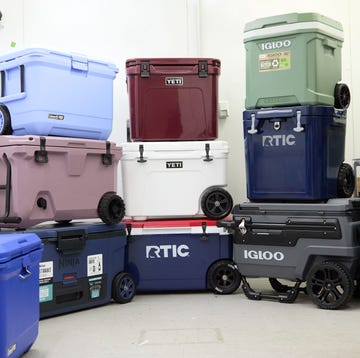
The Best Coolers With Wheels
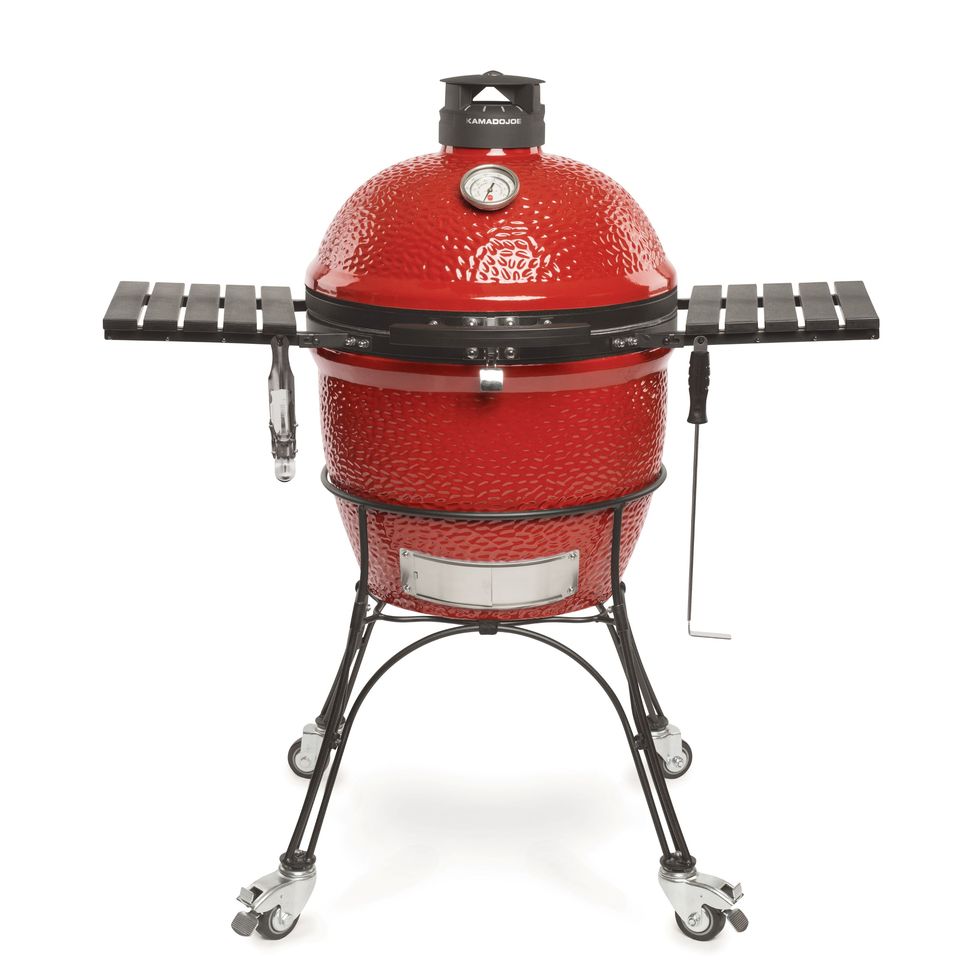




.jpg?crop=1xw:1.00xh;center,top&resize=980:*)
